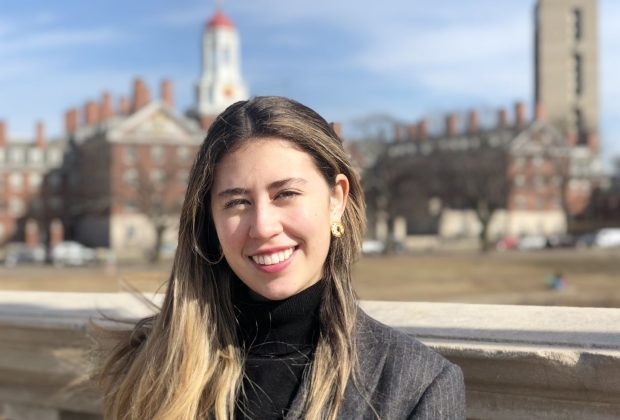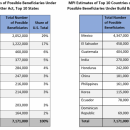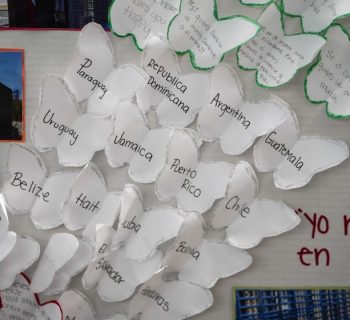By Shannon Larson, Boston Globe
Raquel Coronell Uribe had tempered her expectations as she spoke with a close friend over the phone on Sunday night in an attempt to distract herself.
She knew deliberations among outgoing members of the Harvard Crimson’s masthead had ended that evening — and sooner or later, the college junior would be receiving a call informing her whether she had been chosen as the publication’s next president.
Then the phone buzzed. On the other end of the line was current president Amanda Y. Su. The end of an arduous, almost five-week process to select the Crimson’s next leaders known as the “Turkey Shoot” had drawn to a close. Coronell Uribe had been chosen to lead the nation’s oldest published daily college paper — making her the first Latinx person at the helm in its nearly 150-year storied history. She will start this January.
“I was so shocked,” she said in a phone interview on Saturday morning following the Crimson’s public announcement Friday. “I was just like, ‘What?’ But it was a really great moment.”
Coronell Uribe, who is currently studying history and literature, recognizes the weight of the moment. The 23-year-old called her ascension to the position — from a reporter on the police accountability beat and social media manager to the person responsible for overseeing its entire operation — a “huge honor,” adding that she hopes it will leave the door open “for future Latinx presidents and future firsts as well.”
“I hope that this kind of allows me to set things up in a way that makes sure that as we’re having more of these historic firsts they aren’t last,” Coronell Uribe said. “I’m really hoping that I can be a good president, not only for myself but also because being the first Latinx president, you kind of want to leave a good quote-on-quote legacy, if you will. So it definitely adds, I think, an extra layer of pressure.”
In a message on Twitter, Su said she “could not be more proud and excited to pass the torch to her.”
“The 149th Guard is an incredibly impressive group of leaders who are more than ready and qualified to tackle the challenges The Crimson will face in the coming year,” Su told the student paper of the new guard.
Coronell Uribe said she initially had serious doubts about whether she would be in contention for the position, and sought out Kristine Guillaume, the first Black woman to lead the publication, for her guidance.
“She gave me the reassurance and the pep talk that I needed to kind of make that final decision and say, ‘Okay, I’ll go for it.’ And then after I got the decision, she sent me a really kind e-mail that made my day,” Coronell Uribe said. “She’s someone I admire a lot, so it meant a lot to me to have her support.”
Guillaume touched on the “historic moment” of Coronell Uribe’s ascension after the news was announced.
Originally from Colombia, Coronell Uribe has a natural curiosity for seeking out the truth running through her veins. Her mother is María Cristina Uribe, a former news anchor. And her father is Daniel Coronell, the former president of Univision News, who now works for a radio station in Colombia and is also “starting a magazine there,” Coronell Uribe said.
When she was six, Coronell Uribe said the family was forced to relocate to the United States after her family received death threats following her father’s reporting on the Colombian government. They eventually settled in Miami.
“What it actually did, I think, was just show me the importance of what journalism is and made me question, you know, if there are people who are willing to go to such lengths to just cover up the truth, then the truth must be really important,” she said.
But Coronell Uribe did not enter her freshman year with the intention of diving headfirst into journalism — spending long nights in the newsroom and seeking out sources. Instead, she began as a pre-med major. She was diagnosed with leukemia at 16, and Coronell Uribe said her doctor “literally saved my life.”
“I felt like that’s really what I wanted to do — to just be exactly like him,” Coronell Uribe said. But then she was reading the Crimson daily, writing for the paper, and taking a variety of other classes when she hit a realization: “My heart really is much more where journalism is.”
She will lead the paper alongside Jasper Goodman, who will serve as managing editor, and Amy Zhou, who will take on the role of business manager. With the knowledge that many college newsrooms lack the representation of Black and Latinx students in the chief position, Coronell Uribe — who heads the paper’s internal Latinx affinity group — said she plans on pushing the Crimson to be more inclusive and representative of communities of color.
“I think that it’s not something that you could do from one day to the next. It involves outreach, and it involves making sure that you have the trust of communities of color — to make them feel like there is a place for them at the Crimson and there’s room for them to succeed,” she said. “I partially hope that winning the presidency is one of the things that can kind of help communicate that — that no matter what background you’re from, or what race or what ethnicity, you are able to succeed at an organization as old as one who is still having firsts.”
But for now, as she prepares for the role, Coronell Uribe is just slowly taking it all in. From Texas Representative Joaquin Castro to Miami-Dade County Mayor Daniella Levine Cava, she has already received a wave of congratulatory messages.
“It feels really crazy and surreal. I feel like I’m in a dream, and I’m going to wake up,” she said. “I’m humbled to know that this has an impact that it does on my community back home and the Latinx community, so it’s been deeply honoring and also overall pretty shocking.”







